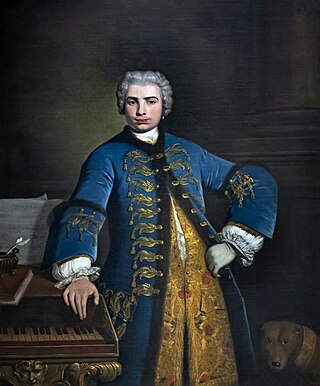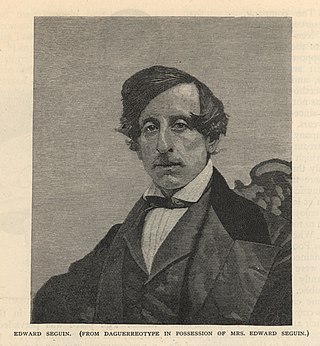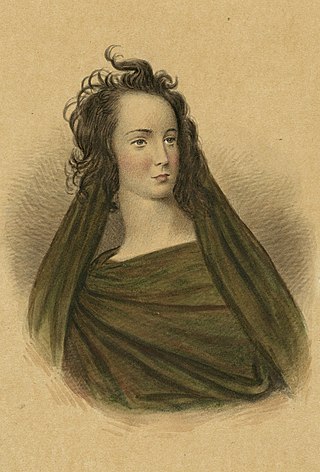Background
Although written around 1818 in Dublin, the opera was not performed until almost twenty years later, at Covent Garden Theatre, London, on 2 December 1837. [2] The music critic George Hogarth considered that the work displayed "genius, learning, taste, and a rich vein of melody, flowing, graceful and expressive", whilst the orchestral writing was "skillful and beautiful". The role of Amilie was played by the soprano Jane Shirreff (1811–1883). [3] The Musical Review was not so complimentary, quoting the London correspondent of the New York Mirror : although conceding that "the music [...] is of a superior description", he added that "the plot is almost unintelligible" and that "vocal talent is at a miserably low ebb." [4]
The production's success however led to further performances elsewhere. Michael William Balfe (who had studied with Rooke as a boy) [2] sang the baritone role in a performance at the Theatre Royal, Dublin in 1838, [5] and the opera was performed in New York at the National Theatre on 15 October in the same year, with Jane Shirreff repeating the title role in her American debut and with the Scottish tenor John Wilson as Jose. Her success there led to a 20-month tour of the US (with Wilson as her manager). [6] The second act was given as part of a musical entertainment at the same theatre in 1839. [7] The music historian Karen Alquist couples the American debut of Amilie with the contemporary performance there of Bellini's La Sonnambula , and suggests that "they taught New Yorkers a new musical style, enabling them to enjoy a broad new repertoire in which elaborate musical structures were no longer reduced to simple ballad forms but could be understood in their own terms". [8]
The work's success gave rise to further performances in America, including a burlesque version by the actor-manager William Mitchell at the Olympic Theatre, New York, in 1839, entitled Amy Lee, or Who Loves Best? [9]
The existence of manuscript orchestral parts, copied in New York, with the stamp of a Melbourne agent, in the National Library of Australia [10] suggests there must also have been antipodean performances. Indeed, The Melbourne Argus of Tuesday 20 January 1863 refers to the Australian Premiere at the Theatre Royal "last night."
Rooke's subsequent operas did not meet the success of Amilie: Henrique, or the Love Pilgrim was pulled after a few performances in London in 1839, (perhaps due to disagreements with the manager of Covent Garden, William Macready), and his subsequent works Cagliostro and The Valkyrie were never staged. [2]

Michael William Balfe was an Irish composer, best remembered for his operas, especially The Bohemian Girl.

Sir John Barbirolli was a British conductor and cellist. He is remembered above all as conductor of the Hallé Orchestra in Manchester, which he helped save from dissolution in 1943 and conducted for the rest of his life. Earlier in his career he was Arturo Toscanini's successor as music director of the New York Philharmonic, serving from 1936 to 1943. He was also chief conductor of the Houston Symphony from 1961 to 1967, and was a guest conductor of many other orchestras, including the BBC Symphony Orchestra, London Symphony Orchestra, the Philharmonia, the Berlin Philharmonic and the Vienna Philharmonic, with all of which he made recordings.

Charles Bannister (1738–1804) was an English actor, comedian and singer.

Lucia Elizabeth Vestris was an English actress and a contralto opera singer, appearing in works by, among others, Mozart and Rossini. While popular in her time, she was more notable as a theatre producer and manager. After accumulating a fortune from her performances, she leased the Olympic Theatre in London and produced a series of burlesques and extravaganzas, especially popular works by James Planché, for which the house became famous. She also produced his work at other theatres she managed.

The Royal Opera House (ROH) is an opera house and major performing arts venue in Covent Garden, central London. The large building is often referred to as simply Covent Garden, after a previous use of the site. It is the home of The Royal Opera, The Royal Ballet, and the Orchestra of the Royal Opera House. The first theatre on the site, the Theatre Royal (1732), served primarily as a playhouse for the first hundred years of its history. In 1734, the first ballet was presented. A year later, the first season of operas, by George Frideric Handel, began. Many of his operas and oratorios were specifically written for Covent Garden and had their premieres there.
The history of opera in the English language commences in the 17th century.

John Arthur Lanchbery OBE was an English-Australian composer and conductor, famous for his ballet arrangements. He served as the Principal Conductor of the Royal Ballet from 1959 to 1972, Principal Conductor of the Australian Ballet from 1972 to 1977, and Musical Director of the American Ballet Theatre from 1978 to 1980. He continued to conduct regularly for the Royal Ballet until 2001.

The Carl Rosa Opera Company was founded in 1873 by Carl Rosa, a German-born musical impresario, and his wife, British operatic soprano Euphrosyne Parepa-Rosa to present opera in English in London and the British provinces. The company premiered many operas in the UK, employing a mix of established opera stars and young singers, reaching new opera audiences with popularly priced tickets. It survived Rosa's death in 1889, and continued to present opera in English on tour until 1960, when it was obliged to close for lack of funds. The company was revived in 1997, presenting mostly lighter operatic works including those by Gilbert and Sullivan. The company "was arguably the most influential opera company ever in the UK".

Edmund Falconer, born Edmund O'Rourke, was an Irish poet, actor, theatre manager, songwriter and playwright, known for his keen wit and outstanding acting skills.
Thomas Welsh was an English composer and operatic bass. Welsh spent most of his life in London and is now particularly remembered for his light-hearted stage works.
William Michael Rooke was an Irish violinist and composer.

The Mountain Sylph is an opera in two acts by John Barnett to a libretto by Thomas James Thackeray, after Trilby, ou le lutin d'Argail by Charles Nodier. It was first produced in London at the Lyceum Theatre in 1834 with great success.

Farinelli is an opera in two acts, described as 'serio-comic', by John Barnett, to a libretto by his brother Charles Zachary Barnett. Produced in 1839, it is the third of the composer's large-scale operas, and was the last to reach the stage. The hero is the castrato singer Farinelli, although the storyline of the opera is fictional.

The Rose of Castille is an opera in three acts, with music by Michael William Balfe to an English-language libretto by Augustus Glossop Harris and Edmund Falconer, after the libretto by Adolphe d'Ennery and Clairville for Adolphe Adam's Le muletier de Tolède (1854). It was premiered on 29 October 1857, at the Lyceum Theatre, London.

William Harrison was an English tenor and opera impresario. He was best known for creating roles in new operas by British composers from the 1840s to the early 1860s. Among those who composed for him were William Vincent Wallace, Michael William Balfe and Julius Benedict. After working for Alfred Bunn at the Theatre Royal, Drury Lane, Harrison set up a company in partnership with the soprano Louisa Pyne, which enjoyed success in North America and London in the 1850s.

Ann(e) Childe Seguin (1811–1888) was a British and American opera singer who was part of the Seguin Troupe in America. Her best known role was as the lead in The Bohemian Girl.

Arthur Seguin was an English operatic bass singer. He appeared in opera houses in London in the 1830s; from 1838 he lived in America, appearing in New York and touring the USA and Canada.

Olympic Theatre was the name of five former 19th and early 20th-century theatres on Broadway in Manhattan and in Brooklyn, New York.

Jane Shirreff (1808-1883) was a British soprano opera singer and stage actress. She was described as America's "most admired prima donna between the days of Mrs. Wood and those of Louisa Pyne".
George Frederick Stansbury was a British composer, musical director and arranger and an operatic singer. Although contemporary reviewers described his voice as of "poor quality", he was nevertheless an excellent musician and a ready composer.















